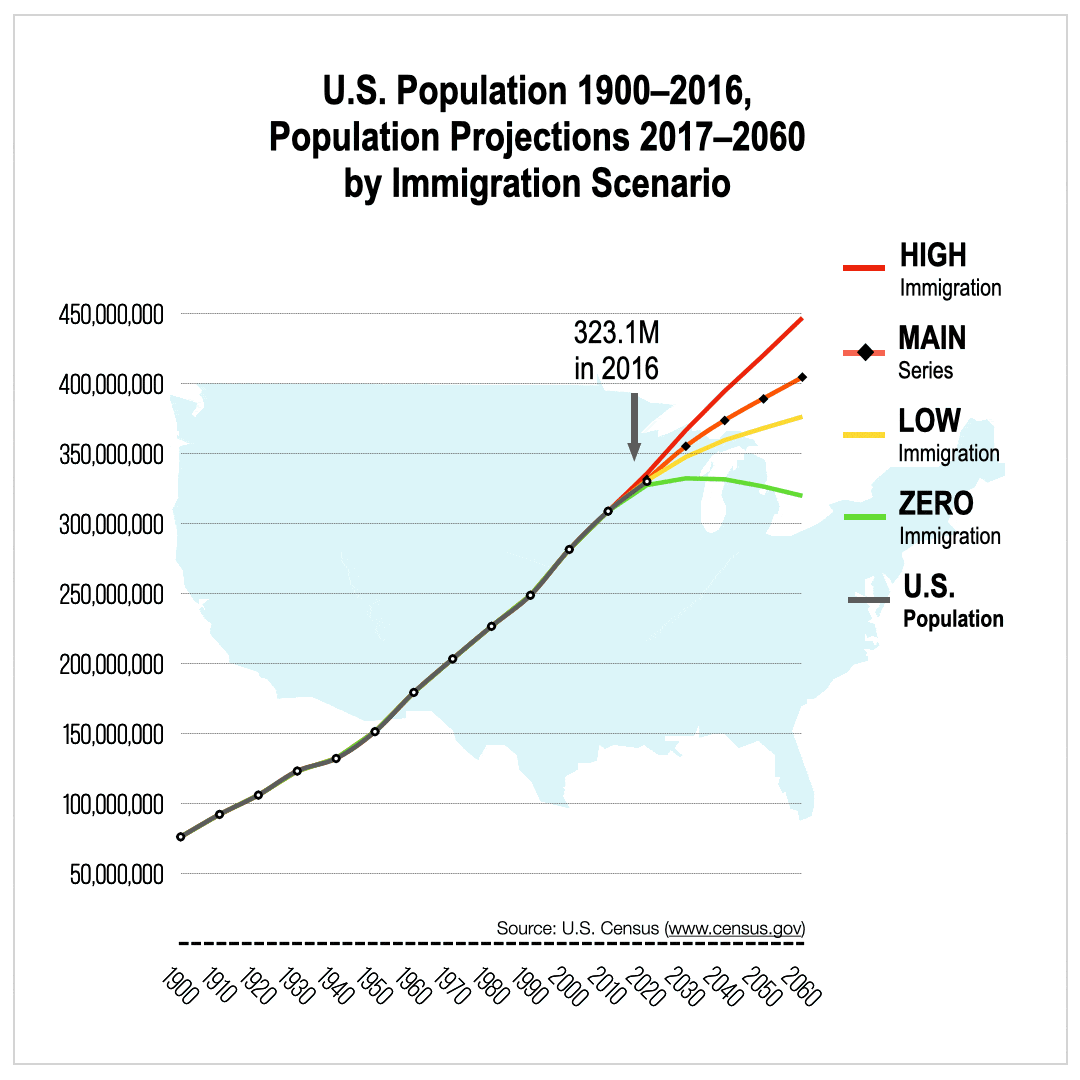How far do you have to go to find peace and tranquility, away from the sounds of traffic or construction? One in twenty heart attacks in cities have been linked to noise pollution. But by some estimates, there are only roughly one dozen places in the entire United States where one can listen for 15 minutes without hearing a man-made sound.
Americans love our open spaces. “Oh beautiful, for spacious skies,” begins Katerine Lee Bates’ poem.
America! God shed his grace on thee
Yes, Bates’s poem celebrates the “alabaster cities, undimmed by human tears,” but also pleads to America to “confirm thy soul in self control.”
Our immigration system – another treasured aspect of America – has been manipulated to sacrifice the serenity of future generations for the sake of growing the number of American consumers, driving up the demand for more housing, more roads, more cars, trains, and buses.

A better system, in accordance with the concept of “self-control,” would honor our immigration tradition and preserve Americans’ – all Americans’ – abilities to reach those serene places our nation has been blessed with.
|
“There is a reason you don’t see heavy traffic and tall buildings in videos where serenity is the intention,” writes Dr. Karen Shragg. “Being overcrowded produces tension and creates irritability. Being in nature with few people and lovely breezes with plenty of trees gives us ‘that peaceful easy feeling’ as described by the Eagles.”
“If we are really concerned about being fair and moral, we need to consider the conditions growth is setting up for a continued downward spiral of our country’s mental health. Because when serenity becomes as rare as the animals on the endangered species list, we will not be far behind.”
During the COVID-19 pandemic, Americans surged into national parks and other open spaces. Our sheer numbers not only limited the serenity available to us, but also disrupted the wildlife behavior within those areas.
“We know that there’s only so many people you can cram into a place before there’s a bad effect,” said John Waller, a biologist who studied the phenomenon in Montana. “The take home message for us is that our presence on the landscape has profound effects on these species and we need to take that seriously.”
American culture involves an immersive relationship, writes Wyatt Verlen, where we “can touch, not just look”:
“George Washington relieved his stress from presiding over the Constitutional Convention by going fishing. Teddy Roosevelt, the father of the conservation movement, sought to preserve open spaces and thereby prevent America from turning into Europe, where hunting — and the primal connection with nature it offers — was a privilege reserved only for the rich.”
If immigration numbers stay constant or increase, more and more nature will necessarily be roped off from visitors, like the rooms in George Washington’s home, Mount Vernon.
“We professional natural resource managers and environmental planners refer to “consumptive” and “non-consumptive” outdoor recreation,” says NumbersUSA’s Scientific Director, Leon Kolankiewicz, “and both have their place when properly managed.”
“Properly managed.“
“Confirm thy soul in self control.“
“With a population anywhere from 500 million to a full billion,” Verlen writes, “it will be impossible for millions of hunters, fisherman and foragers to enjoy the same routine interactions with nature that they have today. A country so densely populated would need far more regulations on what can be used and what must be left ‘undisturbed’ in natural settings.”
How far will future Americans have to go to find serenity? And will those paths be open to everyone? The future has no voice in this debate. It’s up to us to determine their fate.
|
NumbersUSA’s Sprawl Study Media
Leon’s op-ed in Texas’ oldest newspaper, The Daily News, is behind a paywall, but here’s the money quote:
“Texans realize it’s dangerous to add residents their state can’t support. Nearly 6 in 10 want the U.S. government to reduce annual immigration levels. And more than 7 in 10 support requiring all employers to use E-Verify….
“….Lawmakers could preserve the Lone Star State’s open space legacy – farmland and natural habitat – for future generations. They just need the political will.”
And Todd Wilkinson of The Mountain Journal reviewed our national study and asks, “Is there any rural place in America that, amid intense development pressure, has managed to hold onto its special character in the absence of foresighted zoning?”
“A torrent of growth and land development inundating the western third of Montana,” Wilkinson writes, “stretching from the Greater Yellowstone Ecosystem on the south northward hundreds of miles to the US border with Canada, has generated huge concerns.”
As our studies and surveys have demonstrated, Wilkinson reports on the yawning divide between public opinion and public officials on the question of growth and its drivers. The number one driver, of course, is federal immigration policy.
“To allow unfettered development is to potentially diminish the value not only to people who live here but to the millions of people who visit here every year.”
There are tools at the state and local level to preserve local character, nature, and quality of life, but there is only so much that can be done without addressing the elephant in the room.
JEREMY BECK is a V.P., Deputy Director for NumbersUSA
Take Action
Your voice counts! Let your Member of Congress know where you stand on immigration issues through the Action Board. Not a NumbersUSA member? Sign up here to get started.
Donate Today!
NumbersUSA is a non-profit, non-partisan organization that relies on your donations to works toward sensible immigration policies. NumbersUSA Education & Research Foundation is recognized by America's Best Charities as one of the top 3% of well-run charities.
Immigration Grade Cards
NumbersUSA provides the only comprehensive immigration grade cards. See how your member of Congress’ rates and find grades going back to the 104th Congress (1995-97).